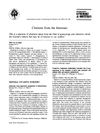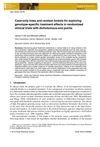 June 2020 in “Journal of genetic medicine”
June 2020 in “Journal of genetic medicine” The document's conclusion cannot be provided because the document is not accessible or understandable.
 6 citations,
October 2012 in “Journal of Heredity”
6 citations,
October 2012 in “Journal of Heredity” The Itpr3 gene causes a specific hair pattern in mice.
 May 2015 in “Journal of The American Academy of Dermatology”
May 2015 in “Journal of The American Academy of Dermatology” There's a growing resistance to the antibiotic mupirocin in children's skin infections caused by MRSA in New York.
 3 citations,
June 1995 in “International Journal of Gynecology & Obstetrics”
3 citations,
June 1995 in “International Journal of Gynecology & Obstetrics” Laser laparoscopy effectively reduces pelvic pain in women with mild to moderate endometriosis and is safe to use.
 45 citations,
November 2012
45 citations,
November 2012 The conclusion is that androgen receptor gene polymorphism might be a marker for polycystic ovary syndrome, but more research is needed.
 3 citations,
January 2019 in “Jikken doubutsu ihou/Jikken doubutsu/Experimental animals/Jikken Dobutsu”
3 citations,
January 2019 in “Jikken doubutsu ihou/Jikken doubutsu/Experimental animals/Jikken Dobutsu” Pigs without the Hairless gene showed skin and thymus changes, useful for studying human hair disorders.
 3 citations,
October 1988 in “Clinics in Dermatology”
3 citations,
October 1988 in “Clinics in Dermatology” Using 3% topical minoxidil can help women with hair loss, but more research is needed.
 411 citations,
April 2010 in “Gastroenterology”
411 citations,
April 2010 in “Gastroenterology” Targeting colon cancer stem cells might lead to better treatment results.
 46 citations,
June 2015 in “Journal of Investigative Dermatology”
46 citations,
June 2015 in “Journal of Investigative Dermatology” Androgen receptor activity blocks Wnt/β-catenin signaling, affecting hair growth and skin cell balance.
 26 citations,
November 2010 in “Experimental Dermatology”
26 citations,
November 2010 in “Experimental Dermatology” Two gene areas linked to male pattern baldness found, more research needed.
 14 citations,
January 2019 in “Skin appendage disorders”
14 citations,
January 2019 in “Skin appendage disorders” PFS might be a delusional disorder with potential to become mass psychogenic illness.
 11 citations,
February 2007 in “Journal of Child and Adolescent Psychiatric Nursing”
11 citations,
February 2007 in “Journal of Child and Adolescent Psychiatric Nursing” Combining mood stabilizers with antipsychotics is more effective for treating children with bipolar disorder than using mood stabilizers alone.
 8 citations,
March 2020 in “Aesthetic Plastic Surgery”
8 citations,
March 2020 in “Aesthetic Plastic Surgery” Finasteride and minoxidil together safely and effectively increase hair growth and density for androgenetic alopecia.
 8 citations,
March 2014 in “American Journal of Pathology”
8 citations,
March 2014 in “American Journal of Pathology” Damaged hair follicles make mice more prone to skin inflammation and skin cancer after UV exposure.
 5 citations,
July 2019 in “Applied statistics/Journal of the Royal Statistical Society. Series C, Applied statistics”
5 citations,
July 2019 in “Applied statistics/Journal of the Royal Statistical Society. Series C, Applied statistics” Case-only trees and random forests improve predictions of treatment effects in clinical trials.
 3 citations,
November 2005 in “Women's health”
3 citations,
November 2005 in “Women's health” Excessive body hair in women can be caused by various conditions and treated with medication like Diane® 35 or androgen blockers.
 2 citations,
November 2019 in “Cancer reports”
2 citations,
November 2019 in “Cancer reports” The Wnt signaling pathway is not a major factor in the development of keratoacanthoma, a type of skin tumor.
 2 citations,
February 2018 in “InTech eBooks”
2 citations,
February 2018 in “InTech eBooks” TNF-alpha inhibitors can cause various immune-related skin issues.
 1 citations,
March 2019 in “KnE life sciences”
1 citations,
March 2019 in “KnE life sciences” HDPCM treatment healed a baby's congenital skin defect caused by varicella infection.
 1 citations,
September 2016 in “Actas Dermo-Sifiliográficas”
1 citations,
September 2016 in “Actas Dermo-Sifiliográficas” 5-alpha reductase inhibitors may cause sexual side effects, breast complications, and other health risks in men with hair loss.
 May 2019 in “Australasian Journal of Dermatology”
May 2019 in “Australasian Journal of Dermatology” A new diagnostic tool for Vulvovaginal Lichen Planus is highly accurate, and updated treatments for various skin conditions, including melanoma and Hidradenitis Suppurativa, were discussed.
 May 2003 in “Journal of Investigative Dermatology”
May 2003 in “Journal of Investigative Dermatology” The meeting covered advances in understanding hair growth, causes of hair loss, and potential treatments.
 1066 citations,
March 2010 in “Nature Reviews Molecular Cell Biology”
1066 citations,
March 2010 in “Nature Reviews Molecular Cell Biology” MicroRNAs are crucial in controlling cell signaling, affecting cancer and tissue regeneration.
 326 citations,
February 2009 in “The American journal of pathology”
326 citations,
February 2009 in “The American journal of pathology” Lgr5 is a marker for active, self-renewing stem cells in the intestine and skin, important for tissue maintenance.
 321 citations,
March 2015 in “Nature”
321 citations,
March 2015 in “Nature” Super-enhancers controlled by pioneer factors like SOX9 are crucial for stem cell adaptability and identity.
 155 citations,
December 2003 in “British Journal of Dermatology”
155 citations,
December 2003 in “British Journal of Dermatology” Hair loss increases with age; alcohol raises risk, more female partners lowers it.
 143 citations,
September 2008 in “Experimental gerontology”
143 citations,
September 2008 in “Experimental gerontology” Skin aging is due to impaired stem cell mobilization or fewer responsive stem cells.
 112 citations,
October 2005 in “Mayo Clinic Proceedings”
112 citations,
October 2005 in “Mayo Clinic Proceedings” Minoxidil and finasteride can slow hair loss and stimulate regrowth, but won't restore all lost hair or reverse complete baldness.
 99 citations,
June 2005 in “Journal of Cosmetic Dermatology”
99 citations,
June 2005 in “Journal of Cosmetic Dermatology” Hair ages due to genetics and environmental factors, leading to graying and thinning, with treatments available for some conditions.
 88 citations,
January 2013 in “Indian Journal of Dermatology, Venereology and Leprology”
88 citations,
January 2013 in “Indian Journal of Dermatology, Venereology and Leprology” Minoxidil and finasteride effectively treat hair loss.






























